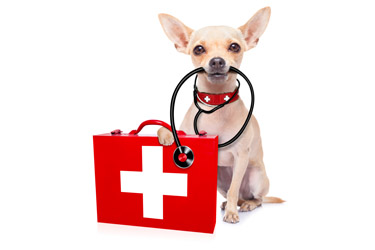Client Tips: Preparing a Disaster Kit for Your Pet

Day-to-day, as we make a mental list of things we need to accomplish, there are usually some items on that list that can be put off until later. However, getting prepared in case of a disaster is not one of those things. When talking with clients, ask if they are aware of what their pet will need during an emergency. Find out if they have a disaster preparedness plan that provides for the needs of their animal.
The following information can be shared with clients who need advice on creating a disaster preparedness kit for their pet.
Provide a Disaster Preparedness Container
Part of being prepared requires having the necessary materials on hand. Items need to be collected and kept in a container that will keep contents dry, such as a lidded tote. The tote should be designated for only this use and needs to be kept in an area that is at a place of easy access. All family members should be aware of its purpose and its location.
Collect Pet-Oriented Information for a Disaster Preparedness Kit
Being prepared involves collecting information. While it is helpful to store a second copy of the information electronically, it is important to place a paper copy within the preparedness tote. The collected information should be placed into a bag that can be closed and made watertight. The material to collect includes:
- Emergency contacts
- Owner’s name, address, phone numbers
- Name of family member(s) or friend(s) to go to for help, addresses, phone numbers
- Veterinarian information: name, clinic name, address, phone numbers, directions
- Emergency Animal Hospital information: name, address, phone numbers, directions
- Closest emergency room information: name, address, phone numbers, directions
- Contact information for local animal ambulance service
- Animal Poison Control Center Hotline number
- Animal health records
- A maintained and up-to-date copy of the health records of all pets, including:
- Shot records
- Background medical information
- Description of any health needs
- List of medications, name, dose, regimen
- Background information that may be helpful if pet is boarded or treated by a different veterinarian or facility
- A maintained and up-to-date copy of the health records of all pets, including:
- Additional pet information that may be of use:
- Up-to-date picture
- Microchip number and associated phone numbers
- Rabies tag number
- Dog license number.
First Aid and Medical Supplies
Clients should be advised to place within the preparedness kit the following:
- A two-week supply of medicine, which can be rotated from the kit as needed
- First aid supplies, including items such as:
- First aid book
- Adhesive tape and gauze
- Antibacterial cream or spray
- Antiseptic wipes
- Emergency blanket
- Tweezers
- Scissors
- Cotton balls and swabs
- Paper towels
- Gallon of water for first aid use.
Supplies
To be prepared in case of disaster, The American Society for the Prevention of Cruelty to Animals (ASPCA) recommends having on hand, for each pet, the following:
- Canned or dry food products sufficient to last for three to seven days
- Seven-day supply of water
Additional items to place within the preparedness kit may include:
- Bowls for both food and water
- Can opener
- Extra leash
- Extra collar with its own pet ID tag
- Portable crate of appropriate size for each pet, bedding for comfort and warmth
- Vehicle harness
- Towels
- Cat litter, tray, scoop, bags for waste
- Flashlight and extra batteries
- Cleaning items:
- Liquid dish soap
- Bleach
- Paper towels
- Disinfectant
- Trash bags.
Evacuation Supplies
In case an evacuation is necessary, the ASPCA recommends that pet owners provide information on the animals that live at the property. Pet owners should include in their preparedness kit several wide, black permanent markers which can be used to write information on the front and/or back doors of the buildings. The written information needs to alert rescue workers of the following:
- Number, types, and location of pets remaining inside the property
- Owner contact and veterinary contact information if animals are left
- Notice that all pets have been evacuated from the property.
The time to get prepared is not when a disaster strikes, but before. Talking with clients may encourage them to take the steps to be ready.
Providing your clients with helpful information is one way to encourage them to return. Additional client information includes:
- Motivating Clients to Keep Pet Vaccinations Current
- Probiotic Pet Food vs Probiotic Supplements
Your Covetrus representatives have many suggestions for client discussion topics, call us at 855.724.3461.
Sources:
https://www.aspca.org/pet-care/general-pet-care/disaster-preparedness
Careers
Are you looking for a place to let your talents shine? At Covetrus, we help our practitioner customers better serve their patients and take pride in providing the best customer experience possible. Search our open positions to see our available opportunities.
Newsletter
Stay current with what’s going on with Covetrus, subscribe to receive our newsletter and email communications. Subscribers will receive the latest information in practice management, sales and marketing, animal health, and more.


Leave a comment